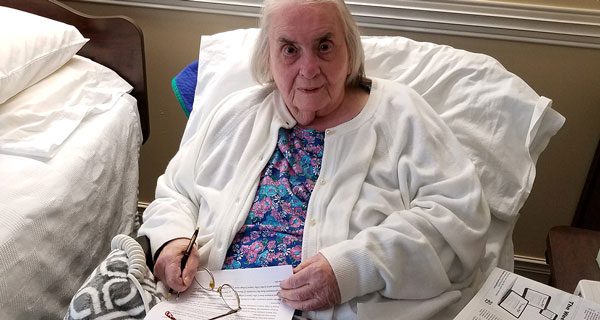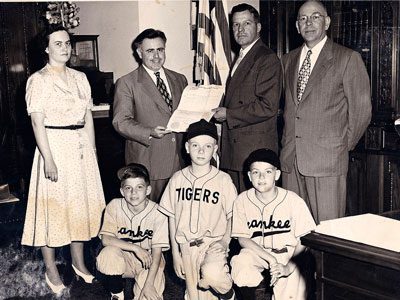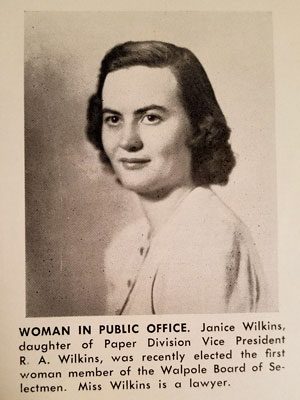[ccfic caption-text format="plaintext"]
By Sam Obar
Women’s foray into Walpole’s top elected board got off to an unpromising start, but now that the first female selectman in Walpole is also the oldest living former selectman, it’s clear that women have a strong legacy in the town’s history books.
Louise Lazarovich was the first woman to run for selectman in Walpole in 1935. She lost, finishing in 10th place out of 10 candidates - with just 273 votes.
At the time, women had served in other roles in Walpole town government, primarily School Committee, where Mary Bird was elected the first female member in 1876. Women across the country did not gain the right to vote until the passage of the 19th Amendment in 1920, but were nonetheless allowed to vote in local School Committee elections since 1879.
After South Walpole’s Lazarovich lost, it took 18 years before another woman mounted a campaign for selectman. This time, the first-time candidate - a young attorney from East Walpole named Janice Wilkins – won. Wilkins, besides being a trailblazer, is now the town’s oldest living former selectman, and one of just a handful still alive today who served on the Board prior to 1970.
Wilkins served on Walpole’s highest board for a decade, from 1953 to 1963. Since her tenure ended, only 10 other women have served on the five-member Board, where there’s never been a female majority.
Wilkins was born in Maine on April 16, 1922, but moved to Walpole in September 1923 when her father, Ralph Wilkins, took a job as assistant superintendent at Bird & Son, Inc. paper mill, which was East Walpole’s major employer. Her mother, Florence G. Wilkins, was a homemaker. Janice has no siblings.
The family initially lived on Fuller Avenue but later moved to 2 (now 3) Park Lane in 1929. Wilkins attended the Walpole public schools and played tennis in high school. In her 1939 Walpole High School yearbook, Wilkins wrote that her career objective was to be a “Doctor’s Assistant.”
But her career seemed to take a different path.
Wilkins obtained an associate’s degree in liberal arts and sciences from Colby Junior College, and went on to earn a bachelor's degree in history and government from the University of Maine, then a law degree from Boston University. She remained active in the Colby Junior College (now Colby-Sawyer) alumni community well into her life.
She was admitted to the Massachusetts bar in 1947. Soon after, she took a job working for The Kendall Company in regulatory compliance and trademarks. Her office was located in downtown Walpole above where Mimi’s Variety is now located.
In 1952, she helped write the articles of incorporation for the Walpole Little League, and was invited to throw out the first ball at the league’s opening day. She was also involved in the Girl Scout Council and local Salvation Army Fund.
By the time she ran for selectman in 1953 as a 30-year-old, she had put together an impressive and – as it turns out – elect-worthy resume. Total turnout in the election was 3,137, out of 5,359 registered voters, a 58 percent turnout that would be a record for a municipal election even today.
At the time, all selectmen in Walpole served one-year terms and town elections were held in January. Wilkins finished third in a field of 12 candidates, capturing 1,456 votes. The four other victors were all incumbent selectmen; Wilkins filled an open seat left by longtime selectman Willis D. McLean, who had opted not to run again.
Wilkins recalled today that campaigns were more low-key at the time.
“I don’t think I spent money at all. I didn’t do anything,” she said.
Articles in the local press during the campaign didn’t seem to touch upon the significance of her candidacy until after the election. The front page headline in The Walpole Times upon her victory was: “Walpole Elects First Lady Selectman Along With Four Re-elected Men.” The article was brief and did not include any quotes from any of the winners.
“I think they [the voters] thought it was a good idea to have a woman selectman,” Wilkins recalled.
Although it’s probably true that electing a woman was intriguing to some of the electorate, Wilkins, who had not previously held any town-wide elected office, also had two other strengths that helped lead to her victory: the prominence of her father, who had been promoted to vice president at Bird & Son, and her own strong connections with the community gained from working as an attorney at The Kendall Company.
Walpole’s industrial giants at the time, led by The Kendall Company and Bird & Son, had an outsized influence on local elections, considering the thousands of townspeople the companies employed.
Not only did Wilkins serve as the first female selectman in Walpole, but she was also one of the first in the entire state. Although records aren’t clear as to who was the first woman selectman in Massachusetts, it is known that Martha Ware, the first female selectman in Plymouth County, sat as an Abington selectman in the 1940s.
Though not first in the state, Wilkins’ victory was nonetheless an historic one.
Wilkins ran for re-election annually for nine years, winning each fairly easily. She was tapped to be chairman of the Board in 1957, and served as clerk of the Board, which was then the second-highest position under chairman, from 1953 to 1956, and again from 1959 to 1960. In 1963, she declined to run again. By that time, her father was president of Bird & Son, and would later become chairman of the company before retiring around 1967.
Wilkins served as a selectman during a time of tremendous growth in Walpole, as the suburbanization of the 1950s was taking place. Between 1955 and 1960, the population of Walpole increased by 25 percent, from 11,293 to 14,068.
Around 1963, Wilkins, who never married and had no kids, moved to New York City to take a job in trademark law working for the American Cyanamid Company. She spent almost 37 years living in New York. Her parents still owned their East Walpole house until their deaths, after which she owned it and stayed there occasionally. During that time, she also worked for the Olin Corporation and its subsidiary, Squibb, in international trademark law. She eventually returned to The Kendall Company in Massachusetts, where she headed its trademark department and retired in 1998.
Wilkins continued to practice law for a time, but she sold her family’s Park Lane home in 2001 and moved to Westwood. She still resides there, now 95 years old and still collecting a pension from The Kendall Company’s corporate successor.
Selectwoman Joanne Damish, who served from 1986 to 1995, said she thinks Wilkins’ training as an attorney and assertive manner likely helped her overcome any potential challenges related to being a woman on the Board. But she said many of the selectmen whom Wilkins served with were courteous, anyway.
“I think the selectmen who served during her time were all gentlemen, people of character, respectful. Many selectmen in Walpole were business owners; they usually realized they needed to treat women with respect,” Damish said.
She said Wilkins should be credited for “breaking the glass ceiling” and likely gave other women the courage to run for selectman, including Eleanor Johnson, who served from 1964 to 1974 and later had a middle school named after her.
There are still political “firsts” for women to achieve in Walpole. There has never been a female moderator nor a female town administrator (except for a brief period in 2001 when Marjarita Doherty served in an interim basis). On most town boards, and in the leadership of town departments, men still outnumber women.
Despite that, Selectman Ann Ragosta, who was elected in June 2017 and now serves with one other woman, Nancy Mackenzie, said she doesn’t think voters look much at gender when they go to the ballot box for local elections.
“I am certain that most people voted for me because of my position on certain issues, rather than because of - or despite - my gender,” Ragosta said.
Ragosta said that one common stereotype of women - that they should stick to their traditional role of managing a household - is actually an asset to serving in leadership roles. “Successfully managing a household is no easy task and it actually mimics running a town,” she said.
Janice Wilkins may live long enough to see women hold the majority on the Board one day. If so, it will be because she, and the women that have followed her on to the Board, have been breaking down that stereotype.



























